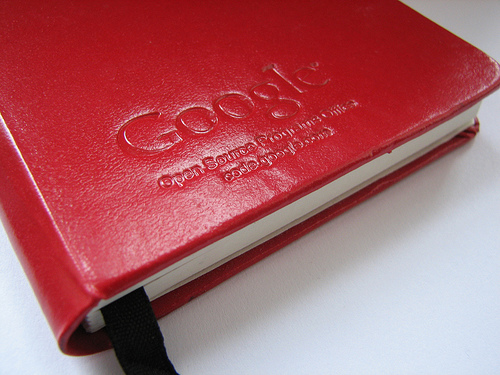Whose books? Google's books
Posted on 17 July 2009 by Thomasin
In a little over six weeks' time the doors will close on all authors and publishers wanting to opt out of the Google books settlement, the US-based class action lawsuit. The settlement, once finalised, will provide one-time compensation from Google in exchange for a licence for Google to use and sell every in-copyright book they have digitised, whether the authors are known or not.

Photo credit: Ruben Vermeersch, Flickr
Unlike the efforts for mass digitisation of public domain books by Microsoft and Yahoo in partnership with the Internet Archive, Google partnered with 20 mainly university libraries in the US and Europe to digitise both in copyright and public domain books. Google used US law to claim a ‘fair use’ right to digitise copyrighted books in their entirety and store them on their servers, making them discoverable only as ‘snippet’ views in their Google Books search. The American Authors Guild and the American Association of Publishers both started class action lawsuits against Google for breach of the US Copyright Act. After long negotiations and no admission of guilt by Google, the parties have arrived at an out of court settlement last October. The deal will effectively licence every in copyright book so far scanned to Google, to use in search results, on-licence to US public libraries and research institutions, and sell digital versions of to the public. The settlement has still to go through several stages before being final, including an anti-trust investigation by the U.S. Department of Justice.
We’ve had a look at what effect this deal might have on New Zealand books, and have come up with a few insights – the good, the bad and the ugly.
The Good
New Zealand authors and publishers are covered by the terms of settlement if they have books protected by US copyright. This extends beyond just those books sold and distributed in the US, to any book available in the US – so for instance, imported by Google’s partner libraries to become part of their collection. New Zealand authors and publishers who want to be part of the settlement and have had their books digitised can lodge a claim for compensation. Copyright Licensing Limited is New Zealand’s main agent in ensuring authors and publishers can make their claims.
The deal overall gives Google the ability to expose the content of their digitised books in search results as snippets, potentially improving digital access enormously for out of print books. This complements their current commercial deals with publishers of in print books.
The Bad
The Google books settlement only provides full book access to libraries, institutions and consumers in the United States. Google Book’s current practice is to block access to US public domain books that they consider might still be in copyright in other countries. This practice will now cover all in copyright books in the US that Google has digitised, meaning they will not be available in New Zealand for the foreseeable future. That’s why you won’t find a copy of Robin Hyde’s The Godwits Fly, or even The Story of a New Zealand River by Jane Mander in Google Books today, despite them both being out of copyright in New Zealand.
It is unlikely Google will undertake a mass digitisation programme for books in New Zealand, as New Zealand’s fair dealing provisions under our Copyright Act are not as open to interpretation as Google claims they are in the US.
The Ugly
Google’s deal has raised many concerns about its potential monopoly price-setting implications, and the precedent it sets for the treatment of out of print orphan works.
The settlement enables Google to receive the most favourable terms for the digital versions of the out of print books licensed to them. That means, for instance, that partner universities cannot provide their digital copies to competitors to licence for sale at a lower price.
The opt-out requirements of the class action effectively licences Google to sell in the US any out of print book where the author or publisher cannot be found. This can provide Google with a significant advantage as a sole publisher and digitiser of these books, given ‘ordinary’ publishers, libraries and others are prevented by the Copyright Act from re-publishing orphan works. This has big implications for digitisation in the US, as their orphan works protection lasts for 95 years for books published prior to 1978. There’s a good write up here by the Oxford University Press about the potential impact.
In New Zealand, literary works of unknown authorship are only protected for 50 years. It seems unlikely therefore that New Zealand researchers and booklovers will see any full versions of the New Zealand titles Google has digitised and that were published in the 20th century.
We've turned off comments here, but we'd still love to know your thoughts. Visit us on our Facebook Page @digitalnz or on Twitter @DigitalNZ to share any ideas or musings with the DigitalNZ team.